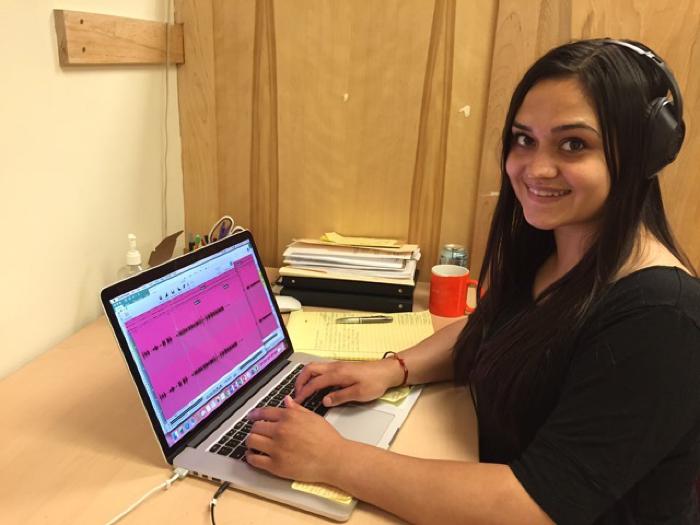Computer — Umiartusqaq
Umiartusqaq masiinaq stuulumi et'uq. – The computer is on the table.

Photo: Rebecca Pruitt edits audio files at the Alutiiq Museum.
There is a common misconception that technological change is synonymous with cultural change, that as people adopt new items of technology they adopt the values and perspectives of other cultures. For example, many visitors to Alaska think there are no true Alaska Natives because people of indigenous descent do not continue to live as their ancestors did, in sod houses, hunting from skin boats with hand-carved tools.
While the technologies people use can profoundly influence the ways they interact with the world, technology is not the sole measure of identity. Anthropologists recognize that all people will use the best technologies available. However, every culture integrates tools into its practices in unique ways. Alutiiq hunters, for example, use their skiffs and rifles to hunt seals in Alutiiq ways, with knowledge of the environment, seal behavior, and the spiritual world passed through generations.
Computers are among the tools that have become important in Alutiiq communities. Today, Alutiiq children learn computer skills at school, Alutiiq fishermen rely on GPS units for navigation assistance, and computers are critical to Alutiiq organizations and businesses. However, they are also put to important Alutiiq uses. With computers, Alutiiq people are recording the sounds of Elder speakers, building dictionaries, and creating language-learning resources. This twenty-first-century tool is helping Alutiiq people with the very ancient practice of passing their language forward.
Like Alutiiq communities, the Alutiiq language has adapted to the changing technological environment. To speak of new technologies, people "Alutiicize" terms with words that describe an object's function. For example, TV in Alutiiq is ulutegwik, meaning "watching place". Computer is umiartusqaq, or "one that thinks". The Alutiiq Museum's island-wide language advisory council developed these terms as part of an effort to create words for today's conversations.
